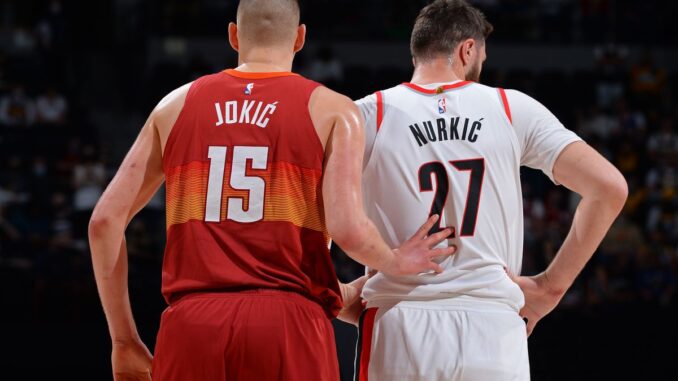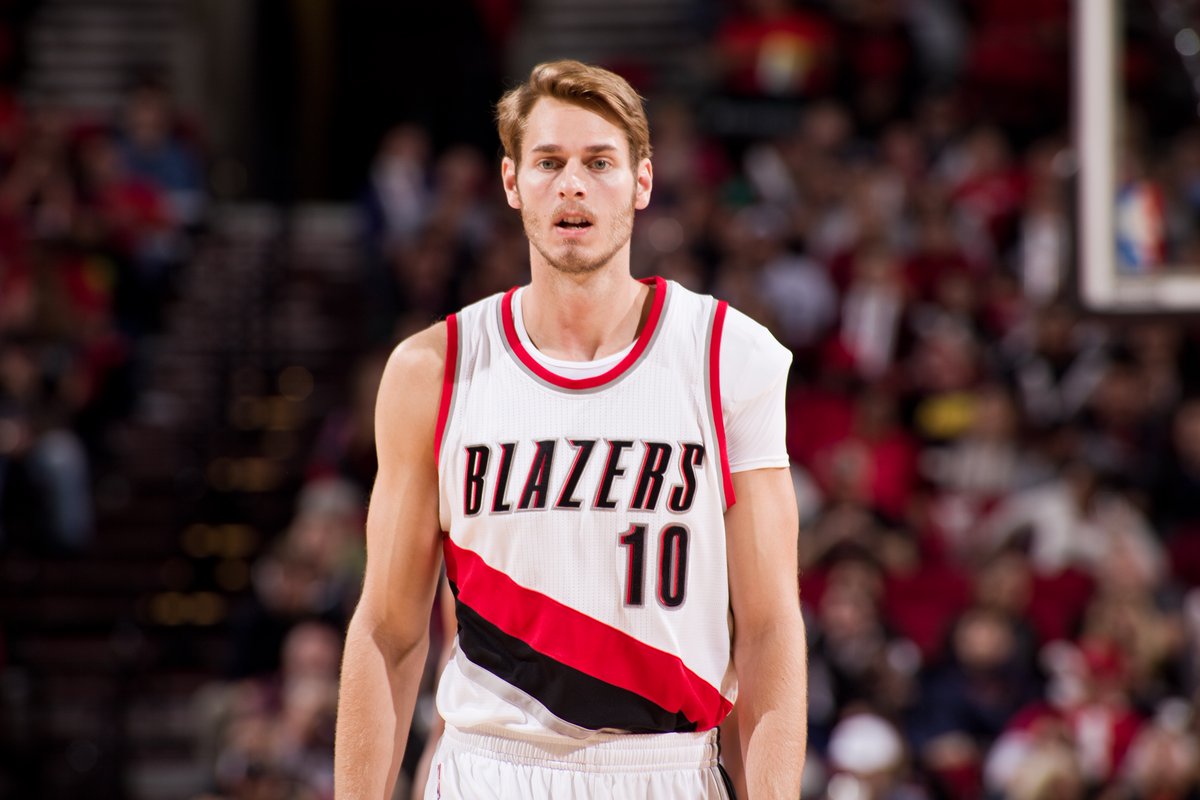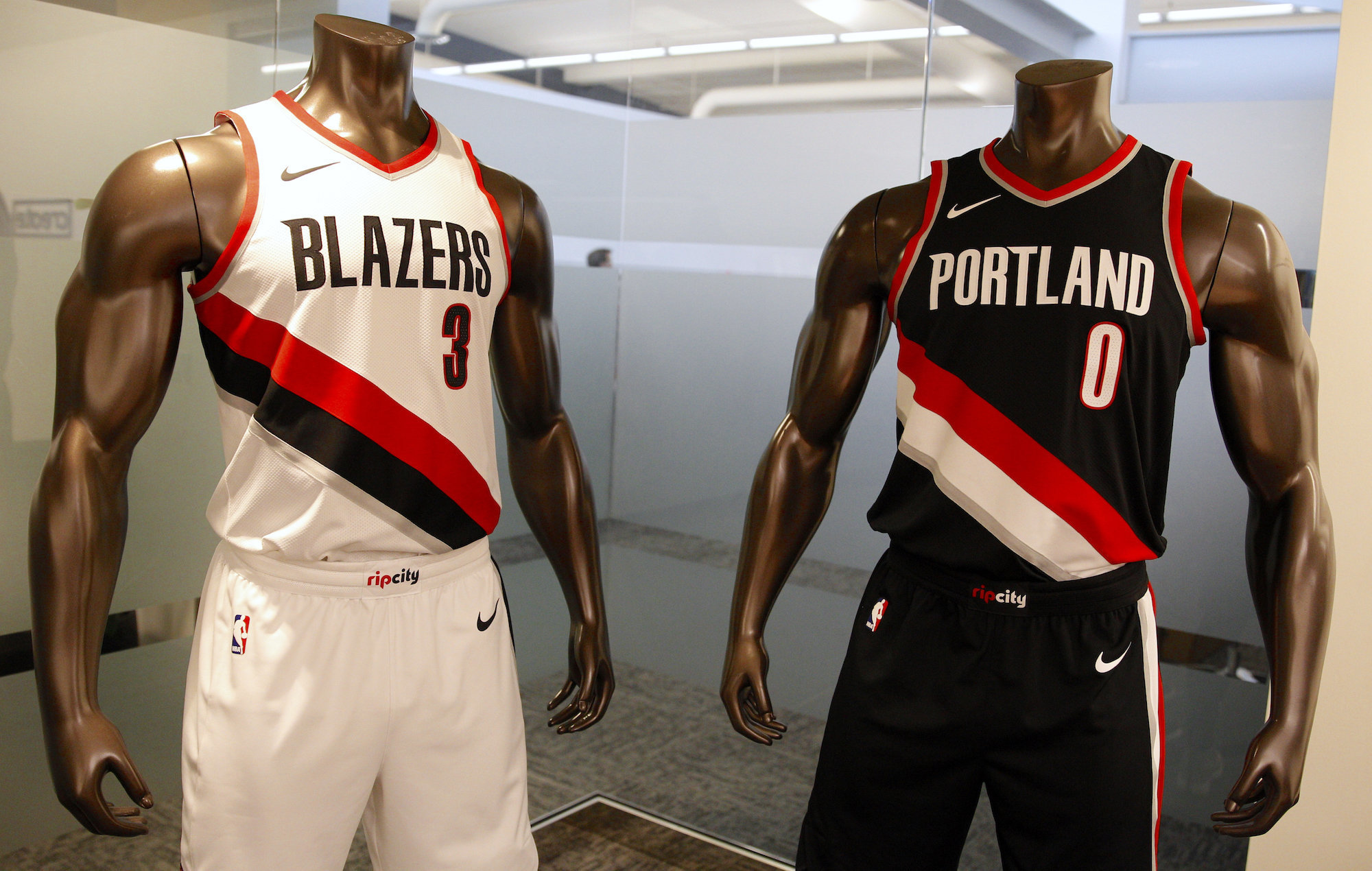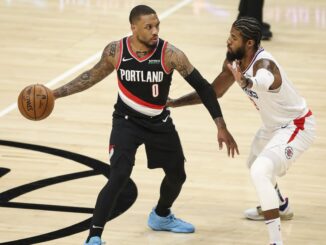
Reigning Most Valuable Player and current MVP front-runner Nikola Jokic completed the first-ever 2,000-point, 1,000-rebound and 500-assist season in NBA history Thursday night. The 6-foot-11 center from Serbia – donning a rare headband after taking an elbow to his forehead that drew blood in the opening minute of the game – helped the Denver Nuggets secure a playoff spot and avoid the play-in tournament with a 122-109 win over the Western Conference’s No. 2-seeded Memphis Grizzlies on Thursday.
Jokic finished with 35 points, 16 rebounds, six assists, five steals, and a block, becoming the first player since Wilt Chamberlain to record at least 35 points and 12 rebounds in five consecutive games.
And while Jokic was making history, Portland was busy dropping its ninth straight, falling 127-94 to the New Orleans Pelicans.
Oddly enough, the Nuggets ended up with both Jokic and Nurkic in the 2014 NBA draft. Denver received Nurkic (the 16th overall pick) and Gary Harris (No. 19) in a draft-day trade with Chicago in exchange for Doug McDermott, the 11th pick. This indicated the Nuggets had found their center of the future. Few even took notice when Denver used its second round pick – No. 41 overall – on a teenage Serbian guy by the name of Nikola Jokic.
So why do Jokic’s accolades matter when it comes to the Trail Blazers? Two words: Jusuf Nurkic.
The then 20-year old Nurkic, a 6-foot-11 Bosnian big man, started 27 of his 62 games and averaged 6.9 points, 6.2 rebounds, and 1.1 blocks during his rookie season for the Nuggets. It would be his only NBA season without the name “Jokic” anywhere within earshot, as the 2014 second round pick was busy earning MVP honors in Serbia’s Adriatic league after averaging 11.4 points, 6.4 rebounds, and 2.5 assists at the age of 19.
It didn’t take long for Jokic’s talent to overshadow Nurkic’s, however, as the “Joker” started 55 games to Nurkic’s three in the 2015-16 season. Jokic posted averages of 10 points, 7 rebounds, 2.4 assists, and 1 steal. Nurkic increased his scoring output to 8.2 points and rose his assist average to 1.3 per game, but he dipped in rebounds (5.5). Jokic finished third in Rookie of the Year voting and was named to the All-Rookie team.
It was evident Nurkic didn’t like his new role as backup, and Denver even tried starting the two bigs alongside one another during the 2016-17 season, but things clearly weren’t working. Nuggets head coach Michael Malone said Jokic volunteered to come off the bench if it would help the team, proving to General Manager Tim Connelly who the more valuable player was. Denver shipped Nurkic – and a first-round pick – off to Portland in exchange for Mason Plumlee and a second-rounder.
Both big men thrived in their roles independent of one another. Nurkic’s averages skyrocketed across the board after the trade. His stats pre-trade (45 games): 8 points, 5.8 rebounds, 1.3 assists, 0.8 blocks, and 0.6 steals. His stats post-trade (20 games): 15.2 points, 10.4 rebounds, 3.2 assists, 1.9 blocks, and 1.3 steals. He finished with splits of 10.2 points, 7.2 rebounds, 1.9 assists, 1.1 blocks, and 0.8 steals. Jokic, who finished second in Most Improved Player voting to Giannis Antetokounmpo that year, had sophomore season stats of 16.7 points, 9.8 rebounds, 4.9 assists, 0.8 blocks, and 0.8 steals.
Obviously, Nurkic was a much more potent player in Portland than he was in Denver, and it looked like the Blazers may have won the trade initially.
Things looked positive for Portland as the Blazers made the playoffs each of Nurkic’s first three seasons with the squad, the third of which – following the 2018-19 season – pitted No. 3-seeded Portland against Jokic and the up-and-coming No. 2-seeded Nuggets in the second round (the Western Conference Semifinals). It was Denver’s first playoff appearance since 2013, and the experienced Blazers prevailed in a hard-fought seven-game series despite playing without Nurkic, who suffered a season-ending injury late in the regular season. Portland went on to get swept in the Western Conference finals by eventual runner-up Golden State.
The Blazers won the series, so they won the trade, right? Not so fast.
While Jokic developed into a triple-double machine and All-Pro over the next couple of seasons, Nurkic essentially leveled off. To be fair, the Bosnian wasn’t asked to do as much and was a reliable No. 3 behind the dynamic duo of Damian Lillard and CJ McCollum.
The Blazers reached the postseason each of the following two seasons, but they haven’t won a playoff series since that 2019 matchup with Denver. This is where the tides really turned in terms of the trade.
Nurkic had a down year in 2020-21 statistically – partially due to injuries – but where Jokic has continued to blossom, Nurkic has been relatively sedentary over his five-and-a-half years in Portland. The 2021-22 season saw the Bosnian – who is set to become a free agent this offseason – play in 56 games before plantar fasciitis forced him out for the remainder of the year. Nurkic averaged 15 points, 11.1 rebounds (career high), 2.8 assists, and 1.1 steals per game. Jokic has never played in fewer than 72 games in a season – and that number came last year when he played in each game possible during the shortened season.
However, it’s not durability that we’re focusing on here (although important). The Blazers’ real misstep in trading for Nurkic is what it allowed Jokic to become. The Joker is now a four-time All-Star, a two-time (soon to be three-time) All-Pro, and the defending league MVP after one of the best single-seasons any player has put together – 26.4 points, 10.8 rebounds, 8.3 assists, 1.3 steals and 0.7 blocks per game. He also posted what was the 10th-highest single-season Player Efficiency Rating (PER) of all time at 31.28 in 2020-21. Yet somehow, Jokic has gotten even better this season, putting up averages of 27.1 points, 13.8 rebounds, 7.9 assists, 1.5 steals, and 0.9 blocks per game. It’s the first time a player has averaged at least 26 points, 12 rebounds, and 6 assists per game. His PER of 32.92 is the highest all-time for a single season. He’s also shot 58.3 percent from the field, including an absurd 65.2 percent from inside the three-point arc. This all comes without his team’s second and third best players in Jamal Murray and Michael Porter, Jr. Throw in the fact that Thursday night’s history-making game clinched a playoff spot for the short-handed Nuggets, and it’s easy to see why Jokic is favored to win back-to-back MVPs.
To make matters worse for Portland, Denver reached the Western Conference Finals in 2020 and ousted the Blazers in the first round of the 2021 playoffs.
Meanwhile, Portland now sits as the third-worst team in the West and the sixth-worst overall with two games to play. The Blazers’ eight-year playoff run is coming to an end. McCollum is gone. Lillard and Nurkic played in a combined 85 games. Not exactly how the team was expected to shape up following that trade back in 2017.
Nurkic could very well have played his final game for Portland, which should sting for Blazers fans as he was supposed to be a valuable commodity taken from a division rival. Instead, his departure may have unleashed arguably the best player in the NBA. Does the Joker become the probable back-to-back MVP without Portland’s assistance? Impossible to tell, but addition through subtraction suggests Denver seems to have won that trade hands down.



